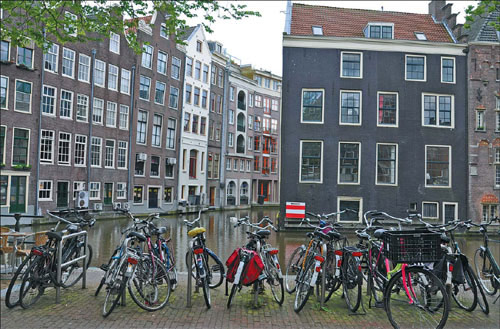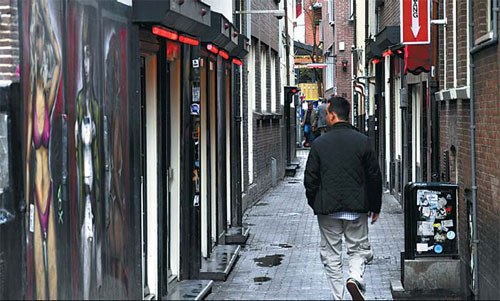Museums, cafes, bikes
 |
|
Bikes are parked for rent against historic buildings along the canals. Biking is the best way to get around Amsterdam. Photos by Jofelle P. Tesorio / For China Daily |
 |
|
The red-light district is just one of the many attractions in this city of beautiful medieval canals. |
For Jofelle P. Tesorio, Amsterdam is one of the few places in the world where you don't get tired after walking a whole day because there is just so much to see and do.
The sun's warm rays and the breezy cool wind endow a refreshing sensation of summer in Amsterdam.
It is Friday afternoon and it is a busy time at the Amsterdam red-light district. It unofficially starts once you turn left from the main Damrak Street coming from Amsterdam central station.
This district is a miniature of globalization. People from around the world converge here - Europeans, Asians, Middle Eastern, Africans; slim, plump, small or tall. And they don't just eat Dutch cheese and bread but Asian dishes as well.
But the red-light district is just icing on the cake. The trip to the Amsterdam doesn't start or end here. It is just one of the many attractions in this city of beautiful medieval canals.
In fact, the famed district sits side-by-side with historic churches, a stone's throw away from the Grand Palace and Madame Tussauds, and within walking distance to Van Gogh Museum, Rijksmuseum and Anne Frank House.
The city is also filled with many other different museums - torture, sex, funeral, maritime, erotic, hash, cheese, tropical - you name it, you'll have it.

It probably has more museums and galleries per square kilometer than any other cities in the world.
I spend more time on Zeedijk Street, a cobbled alley at the edge of the red-light district where Chinatown is located.
Zeedijk (as its English translation 'sea dike' suggests) was protected by sea walls in the 13th century to prevent water from seeping into Amsterdam. By the start of 19th century, it became the center of hospitality. Sailors stopped here to have some fun before they embarked on long lonely months' journey at sea.
By the 1980s, Zeedijk's reputation was changed; the street was littered with not only bars but also countless restaurants offering international dishes, notably Asian.
Just around the corner of an arterial street, an 85-year-old Cafe 't Mandje (The Little Basket) has statement posters and photos covering its front glass wall. One by one, in pairs and in groups, customers filled the cafe.
The street is also dotted with souvenir stores selling Dutch goods - 'I love Amsterdam' T-shirts, caps, miniature wooden shoes, key chains, fridge magnets, post cards and tobacco pipes - to camera-toting tourists.
A nearby restaurant named Thai Bird catches my attention. The menu outside Thai Bird shows only three beers and a few varieties of wine but the food list is extensive - from tom yam kung (shrimp soup) and Pad Thai (noodles) to the most unheard of dishes from northern Thailand.
Adjacent to Thai Bird is a Chinese restaurant with starters costing between 6 and 8 euros, while the main course costs between 15 and 20 euros. Red round lanterns adorn the interior of the restaurant with a jade waving cat figurine on the counter. The aromas of sauteed onions, garlic and spices from the kitchen fill the air.
Luna Antiek sits next to this Chinese restaurant. On display from the glass window are jade items, Oriental accessories, fish decors out of stones and glass, and anything that has to do with Asia.
The shop next door offers Chinese massage. As advertised, in English and Dutch on the window, the massage cures a range of illnesses including migraine, multiple sclerosis and insomnia.
Further down Zeedijk, I pass by the Buddhist Hehua Temple, Malaysian, Indonesian and Thai restaurants, and half a dozen more Chinese restaurants with roasted and steamed ducks hanging on their display windows.
Tourists, armed with maps and travel books, curiously step inside the modest temple ground, where a short flight of stairs leads to an imposing yellow and red building adorned with dragon carvings on the edges.
You won't find a place as Asian in the Netherlands as Zeedijk Street.
At the end of Zeedijk is the Nieuwmarkt square where cafes surround a medieval city gate.
I sit on a bench in front of the medieval gate and see children chasing after diminutive water balloons being 'magically' made by a bohemian-looking fellow while a bearded man with dreadlocks passes by on his rustic green bike.
A group of tourists who are probably in their 60s converge in a circle while listening to their tour guide. They ask questions while gesturing to the windows and old buildings. They all smile when the guide explains something as they move to another narrow alley.
Whether you've just arrived in Amsterdam an hour ago or who have lived here a year, the city doesn't cease to amaze.
Contact the writer at sundayed@chinadaily.com.cn.














